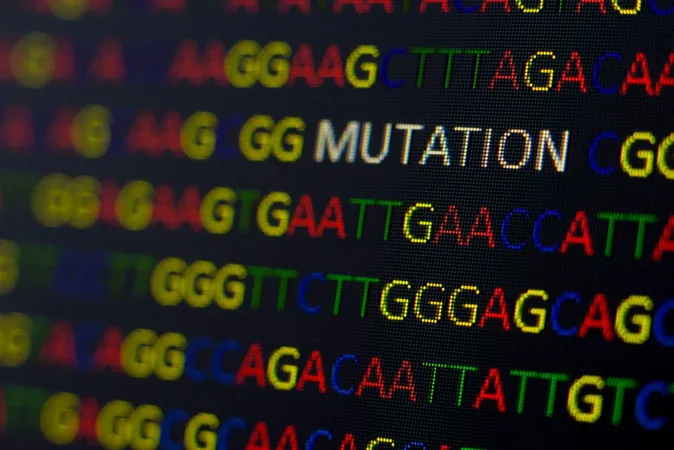
Revolutionary AI Tool Unveils Tumor Weaknesses for Targeted Treatment
2025-04-18
Author: Arjun
Groundbreaking Discovery in Cancer Research
Researchers at the University of Cambridge and NIHR Cambridge Biomedical Research Centre have engineered an innovative algorithm named PRRDetect that focuses on identifying critical mutations within tumors. This cutting-edge tool has the potential to significantly enhance treatment outcomes, particularly for immunotherapy.
Unlocking the Secrets of Tumor DNA
While most research has concentrated on DNA substitutions, the team highlights that small insertions and deletions (InDels) have been largely overlooked. Their study harnesses data from the ambitious 100,000 Genomes Project, utilizing CRISPR technology to develop precise human cellular models that simulate postreplicative repair dysfunction (PRRd). These models incorporate genetic edits targeting DNA mismatch repair (MMR) and replicative polymerases.
A New Era in Personalized Cancer Treatment
The researchers believe that the insights generated by PRRDetect could revolutionize personalized cancer therapies. The algorithm aims to provide valuable guidance on how individual tumors may respond to various treatments, which is critical for success in aggressive cancers like lung and brain tumors.
A Game-Changer for Clinical Genomics
As genomic sequencing becomes quicker and more affordable, Serena Nik-Zainal, the senior author and a leading expert in genomic medicine, emphasizes a shift towards routine tumor sequencing akin to standard blood tests. She states, “To harness genomics in the clinical setting effectively, we require tools that deliver actionable insights on tumor responses to treatment.”
Detecting Vulnerabilities in Cancer
The research team meticulously analyzed DNA sequences to identify distinctive patterns caused by InDel mutations. Their findings revealed unique alterations in cancers with compromised DNA repair systems—an insight that fueled the development of PRRDetect, which functions like a "metal detector" for identifying tumors more likely to benefit from immunotherapy.
Targeting High-Risk Cancers
Focusing on cancers with elevated occurrences of PRRd, including bowel, brain, and lung cancers, the study utilized whole genome sequences from the 100,000 Genomes Project. This monumental project, spearheaded by Genomics England and NHS England, sequenced genomes from approximately 85,000 patients battling rare diseases or cancer.
Identifying Patterns and Future Directions
The study uncovered 37 distinct InDel mutation patterns across various cancer types, with ten already associated with known carcinogenic factors like smoking and UV exposure. Eight patterns indicated PRRd, while the remaining 19 suggested links to yet-to-be-identified cancer causes.
Conclusion: Hope for Tailored Cancer Treatments
As genomic research accelerates, tools like PRRDetect pave the way for more personalized and effective cancer treatments. This milestone in cancer research not only holds promise for better management of current patients but also offers hope in the ongoing battle against cancer.



 Brasil (PT)
Brasil (PT)
 Canada (EN)
Canada (EN)
 Chile (ES)
Chile (ES)
 Česko (CS)
Česko (CS)
 대한민국 (KO)
대한민국 (KO)
 España (ES)
España (ES)
 France (FR)
France (FR)
 Hong Kong (EN)
Hong Kong (EN)
 Italia (IT)
Italia (IT)
 日本 (JA)
日本 (JA)
 Magyarország (HU)
Magyarország (HU)
 Norge (NO)
Norge (NO)
 Polska (PL)
Polska (PL)
 Schweiz (DE)
Schweiz (DE)
 Singapore (EN)
Singapore (EN)
 Sverige (SV)
Sverige (SV)
 Suomi (FI)
Suomi (FI)
 Türkiye (TR)
Türkiye (TR)
 الإمارات العربية المتحدة (AR)
الإمارات العربية المتحدة (AR)